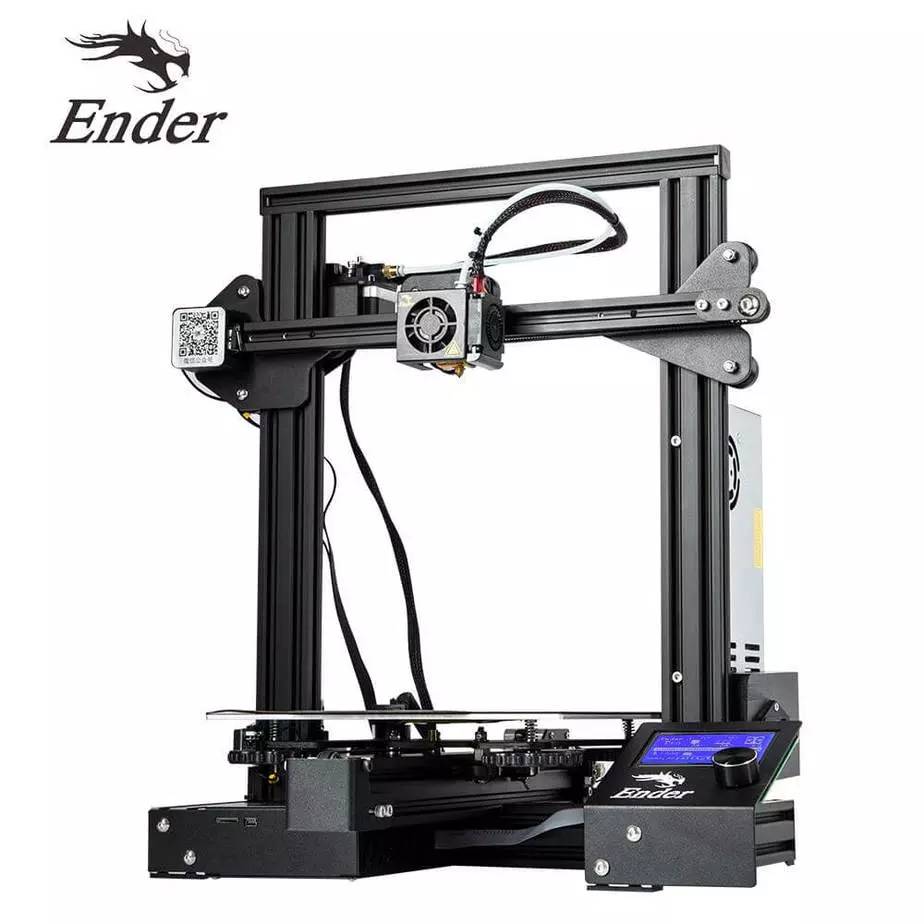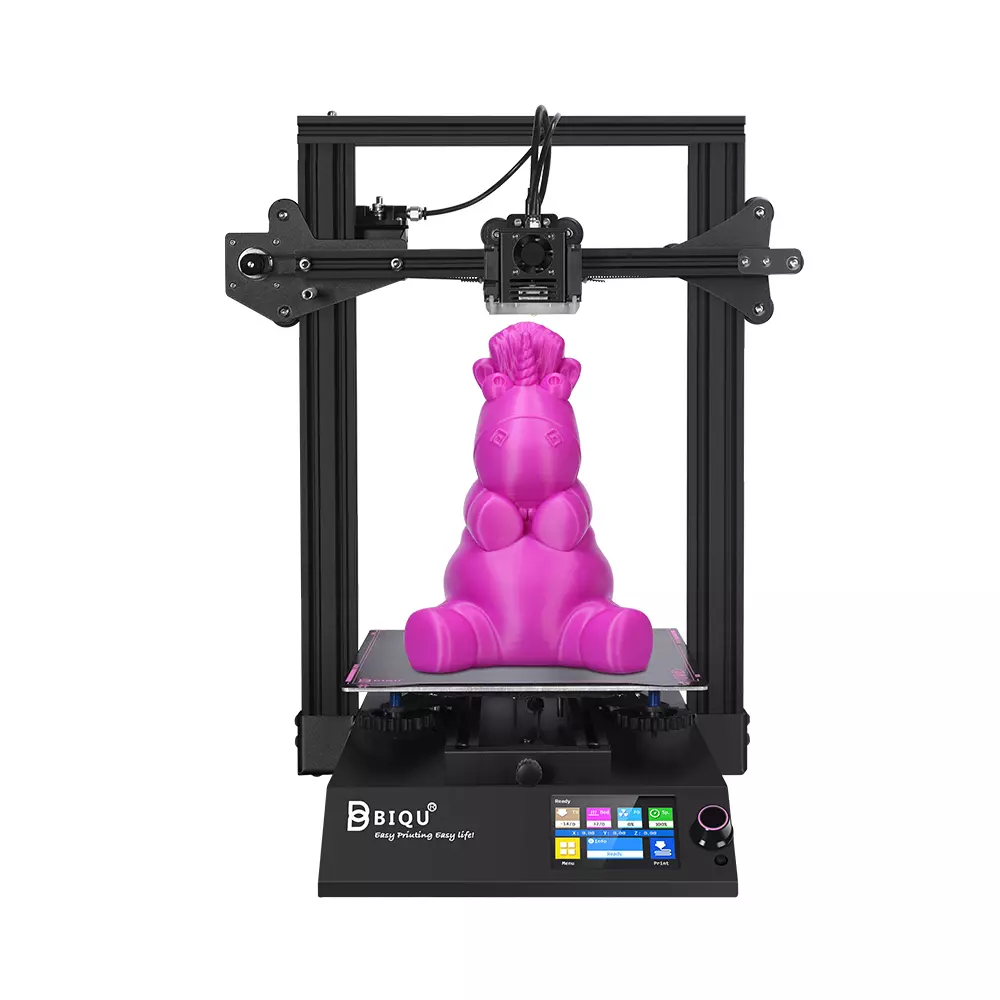Compare Ender 3 PRO vs BIQU B1
Comparison between the best 3D printers
Choose the best 3D printer at the best price. The cheapest 3D printers are here.
Buy a 3D printer here with 3D Fila.
 |
 |
|
| Model | Ender 3 PRO[BUY Ender 3 PRO] |
BIQU B1 |
| Printing Material | Filament | Filament |
| Buy Filament for Creality 3D Ender 3 PRO | Buy Filament forBigTreeTech BIQU B1 | |
| Estimated price | $258,00 | $269,00 |
| Manufacturer | Creality 3D | BigTreeTech |
| Release Year | 2019 | 2020 |
| Print Volume [mm] | 220x220x250 | 235x235x270 |
| Printer Size [mm] | 440x440x465 | 412x402x492 |
| Weight [kg] | 6,62 | 8,00 |
| Power Loss Recovery | NO | YES |
| Enclosed printer | NO | NO |
| Bed Leveling | Manual | Manual |
| Filament End Sensor | NO | YES |
| Bed type | Heated | Heated |
| Power supply system | Bowden | Bowden |
| Standard nozzle | 0,4 | 0,4 |
| Maximum Nozzle Temperature [°C] | 255 | 250 |
| Maximum Bed Temperature [°C] | 110 | 100 |
| Maximum printing speed [mm/s] | 180 | 100 |
| Filament holder | YES | YES |
| Camera for supervision | NO | NO |
| Recommended filaments | PLA, TPU, ABS, PETG | PLA, TPU, ABS, PETG |
| Recommended slicers | Cura, Simplify, Slic3r | Cura, Simplify, Slic3r |
| Maximum Resolution [mm] | 0,1 | 0,1 |
| Processor | 32 bits | 32 Bits BTT SKR V 1.4 |
| Display | Mono | Touchscreen TFT 3,5'' |
| Power Supply | 24V / 360W Meanwell | 24V / 360W |
| Connectivity | SD / USB | SD / USB |
| Operating systems | Windows, Mac, Linux | Windows, Mac, Linux |
| Date of registration in the system | 2021-04-14 | 2021-04-14 |
| Release date | 2019 | 2020 |
| Extra features | The Ender 3 Pro stands out for its beginner-friendly assembly and easily modifiable structure. With a 350W power supply, it heats up quickly and has a simple application that offers good print quality. However, its motors and fans are noisy, and the interface seems outdated. Assembly is accessible, without the need for advanced techniques, and it has integrated belt tensioners. It includes a detailed guide and supports microSD card and USB. | The BIQU B1 is an advanced 3D printer with a silent 32-bit BTT SKR V1.4 motherboard and ARM Cortex-M3 CPU, offering DIY interfaces (I2C, SPI, WiFi) and dual Z-axis. Its dual BTT B1 TFT35 V3.0 operating system allows real-time monitoring and multiple printing modes, including G-code visualization effects. It stands out for its BIQU SSS (Super Spring Steel), ensuring easy model adhesion and simplified removal, with the possibility of using it on both sides. It includes a filament sensor, automatically pausing printing in case of filament breakage. The multicolored RGB lights integrated into the hotend allow you to view the printing status even at night. Additional notes include the need for a BIQU-specific Type-C cable and extra interfaces for smart filament sensor and BL Touch. |
| Support for multiple colors and materials (AMS and CFS) | NO | NO |
Notes * |
||
| Cost-benefit | 6 / 10 | 7 / 10 |
| Hardware | 0.5 / 10 | 2 / 10 |
| Tela | . | . |
| Print volume | 3 / 10 | 3 / 10 |
| Performance | 1 / 10 | 1 / 10 |
| [BUY Ender 3 PRO] |
Conclusion |
| In comparing the Ender 3 Pro and the BIQU B1, both printers cater to enthusiasts looking for reliability and decent performance at a competitive price point. The Ender 3 Pro, released in 2019, provides a strong foundation for beginners with its user-friendly assembly and modifiable structure, making it a popular choice among newcomers to 3D printing. It features a slightly smaller build volume but compensates with faster maximum printing speeds. However, it lacks modern features like power loss recovery and filament sensors, which can be a limitation during extensive printing sessions. On the other hand, the BIQU B1, released in 2020, incorporates several advanced features, including power loss recovery and a filament end sensor. Its larger build volume and quieter operation make it appealing for users who prioritize a more automated printing experience. Moreover, its dual Z-axis and advanced motherboard enhance stability and performance for more complex prints, although it has a slightly lower maximum printing speed. Considering the pricing, both models are closely positioned, but the BIQU B1 offers additional functionalities that may justify the price difference for some users. However, for those prioritizing ease of use and established community support, the Ender 3 Pro remains a solid choice. Ultimately, the decision between the two will depend on individual preferences for features, user experience, and the specific needs of the projects intended. Both printers deliver good value within their respective offering, making them worthy options for anyone looking to enter or advance in the world of 3D printing. |

